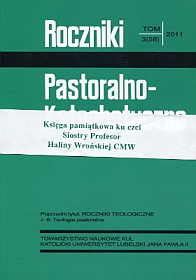Discovering One’s Own Dignity as a Form of Supporting the Development of a Person
Abstract
Supporting the development of a person is done by undertaking manifold educational activities. One kind of them are activities tending to show the pupil his dignity. In looking for explanations of the problem one may be based on the acceptance of two orders of cognition: the natural one and the religious one. On the basis of the presented explanations it may be said that the religious view of the world may significantly support the processes of personal development, of achieving human maturity, and the abilities to take over responsibility in social life that are connected with them. This statement does not have the features of an absolute value, as cases that are contrary to this thesis may appear in these issues. Nevertheless, the fact that the religious (Christian) view of the world opens a more complete access to Transcendence – the source of the ultimate truth, including the truth about himself – to a person weighs in favor of the possibility that religion may support such development. It may also be assumed that in education referring to religious principles and norms we can see man and the world, in which he has to develop and live, in a different, more complete way. And what is more, the Christian view of the world envisions a person’s new meaning of his or her life.
References
Allport G.W.: Osobowość i religia. Warszawa 1988.
Blaskovic S.: Gewissen. W: Praktisches Wörterbuch der Religionspädagogik und Katechetik. Wien–Freiburg–Basel 1978 s. 336.
Brezinka W.: Wychowanie i pedagogika w dobie przemian kulturowych. Tł. J. Kochanowicz, Kraków 2005.
Dąbek T.M.: Godność człowieka na podstawie Biblii. W: Refleksje nad godnością człowieka. Red. A. Królikowska, Z. Marek. Kraków 2007 s. 29-37.
Fraas H.-J.: Religia w procesie rozwoju osobowego dziecka. „Horyzonty Wiary” 6:1995 nr 2.
Frankl V.E.: Bóg nieuświadomiony. Warszawa 1978.
Homa T.: Duchowy niepokój, czyli o sumieniu słów kilka. „Horyzonty Wychowania” 4:2005 nr 2 (8) s. 28-35.
Homlewicz J.: Etyka pedagogiczna. Rzeszów 1996.
Jan Paweł II. Encyklika Slavorum apostoli. Watykan 1985.
Jan Paweł II. Przemówienie do Zgromadzenia Parlamentarnego Rady Europy (Strasburg, 08. 10.1988). W: Przemówienia i homilie Ojca Świętego Jana Pawła II. Kraków 1997 s. 157-158.
Jan Paweł II. Przemówienie do uczestników Międzynarodowej Konferencji na temat AIDS (Rzym, 15.11.1989). W: Przemówienia i homilie Ojca Świętego Jana Pawła II. Kraków 1997 s. 533.
Jan Paweł II. List apostolski Tertio millennio adveniente. Watykan 1994.
Jan Paweł II. Encyklika Evangelium vitae. Watykan 1995.
Ladaria L.F.: Wprowadzenie do antropologii teologicznej. Kraków 1997.
Makselon J.: Człowiek jako istota religijna. W: Psychologia dla teologów. Red. J. Makselon. Kraków 1995.
Marek Z., Szczęsny M., Szołdra K.B., Warchał T.: Bóg w przedszkolu i szkole. Kraków 2002.
Marek Z.: Podstawy wychowania moralnego. Kraków 2005.
Marek Z.: Wychowanie sumienia zadaniem pedagogów? „Horyzonty Wychowania” 4:2005 nr 2 (8) s. 89-108.
Olbrycht K.: Godność w teorii i praktyce wychowania. W: Refleksje nad godnością człowieka. Red. A. Królikowska, Z. Marek. Kraków 2007.
Skorowski H.: Sumienie. W: Słownik społeczny. Red. B. Szlachta. Kraków 2004 s. 1384-1385.
Szostek A.. Wokół godności i miłości. W: Refleksje nad godnością człowieka. Red. A. Królikowska, Z. Marek. Kraków 2007 s. 15-27.
Szyszka E.: Istota poczucia godności w wybranych koncepcjach współczesnej psychologii. W: Refleksje nad godnością człowieka. Red. A. Królikowska, Z. Marek. Kraków 2007 s. 41-47.
Tarnawa J.: Cierpienie, umieranie, nadzieja. Kraków 2003.
Tuin L. van der: Formacja sumienia: działania pedagogiczne czy pertraktacje? „Horyzonty Wychowania” 4:2005 nr 2 (8) s. 139-166.

